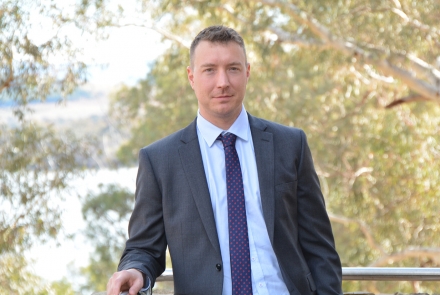
Sights on security
Canberran, lawyer and public servant Kieren Lee-Murphy returned to his alma mater with a firm eye on a future career change.
When, after eight years in the public service, ANU Law graduate Kieran Lee-Murphy decided to further his interest in international relations, he relished the thought of returning to campus. He graduates this month with a Master of National Security Policy (Advanced).
“ANU is a tremendous institution to have in your backyard,” Kieren says. “I was never inclined to look elsewhere.”
After obtaining a Bachelor of Arts/Law in 2007, Kieren went on to roles with the federal Attorney-General’s and Industry departments. He now works in the international policy section of IP Australia on trademark policy and other intellectual property issues.
“But I’ve always been fascinated by international politics, strategic policy and security issues, and I decided that’s something I’d like to work in,” Kieren says.
“A law degree makes you eligible, but not quite as well as having a Masters in the area, so I wanted to bulk out my qualifications in the field.”
ANU is rich in options in his area of interest, but being already in government, Kieren determined that the National Security College at Crawford School was the best fit, because it is not a purely academic institution.
“It’s partnered with the Australian Government, so it has a foot in both camps – academic and practical, real world issues,” he says.
As part of his Advanced Masters, Kieren took on the ‘National Security Policy Sub-thesis’ course, supervised by Associate Professor Michael Clarke. He completed a 15,000 word paper on the future of extended nuclear deterrence for Australia.
He departs with the National Security College Award for the top student in his degree program.
“Notionally, we sit under the US ‘nuclear umbrella’,” Kieren says, “an implied guarantee against those who would threaten us with nuclear attack. I argued that this has been a comfortable assumption and that a lot of developments in the Indo-Pacific region are potentially undermining its credibility – to the extent that it was ever a real guarantee anyway.
“Australia needs to think a bit harder about what we are going to do in a future region where the nuclear dynamics are enlivened in a way they haven’t been for a very long time. There are geopolitical challenges such as the rise of China and North Korea, and technological challenges, such as hypersonic missiles and mini-nukes. All these developments mean that the traditional nuclear equation will be more fragile in future.”
Kieren leaves ANU for a second time with a creeping sense of nostalgia.
“It’s been tremendous – the staff and the whole experience,” he says. “I loved being an ANU undergrad student and I’ve loved being a postgrad student here as well.
“I feel I’m leaving with a very sound understanding of the issues in defence and security policy right now – real world issues such as the state of our alliance with the US, and our place in a complex and evolving region.
“I’m taking away a qualification that will make me more competitive in the fields of security, strategic policy and defence, which are the fields that I’d like to move into.”
Updated: 8 July 2024/Responsible Officer: Crawford Engagement/Page Contact: CAP Web Team












